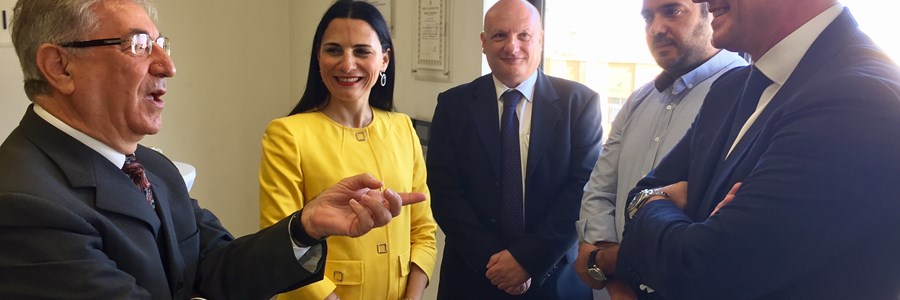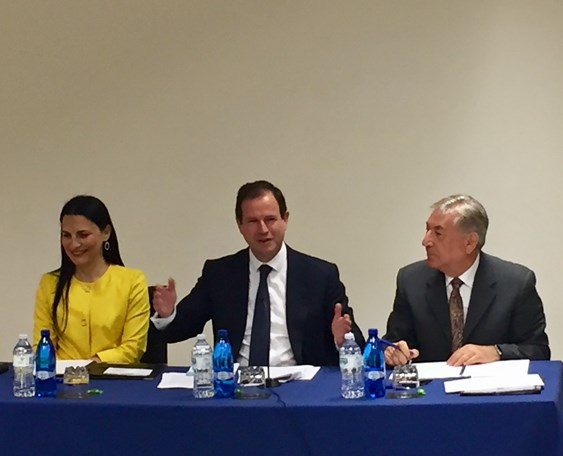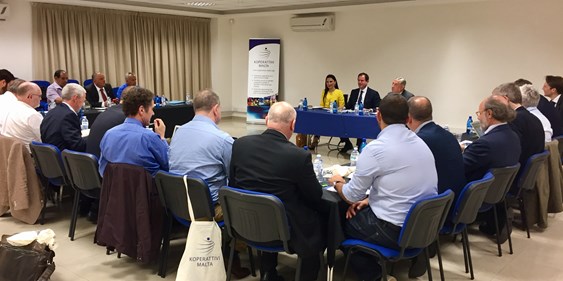Commissaire Vella et de la Présidence maltaise resserrent la coopération avec Europêche pour renforcer la pêche durable et la gestion des océans

Europêche, l'organisme représentatif des pêcheurs et des propriétaires de navires de pêche de l'UE, a eu le privilège de recevoir M. Karmenu Vella (Commissaire à l'environnement, aux affaires maritimes et aux pêches) et Dr Andreina Fenech (Directeur général, Ministère du développement durable, de l'environnement et des changements climatiques ) en tant qu'hôtes d'honneur à l'Assemblée générale d'Europêche tenue au siège de Koperattivi Malta. Tant le commissaire que le directeur général ont coïncidé à valoriser de manière optimiste la tendance positive de la pêche européenne et ont écouté les préoccupations de l'industrie concernant les développements actuels sur les politiques de pêche, en particulier l'obligation de débarquement. Toutes les parties ont manifesté un fort engagement à inverser la situation en Méditerranée en adhérant aux objectifs ambitieux fixés dans la Déclaration MedFish4Ever de Malte.
The President of Europêche, Javier Garat, welcomed the positive attitude and constructive nature of the dialogue; ‘I am very pleased that the Commission and the Council Presidency at their highest level are actively engaging with the fishing sector and have shown a huge eagerness to continue this open door policy into the future.’
Commissioner Vella emphasised the need to work with the sector to ensure true sustainability: ‘Pressure on stocks has fallen considerably. More stocks are being fished at sustainable levels (MSY) each year, and more stocks now fall within safe biological limits. This positive development shows that our joint push for sustainability is paying off. For fish stocks and fishermen alike.’

An extensive range of issues were covered during the course of the meeting. First and foremost, Europêche members informed the EU representatives on the imminent impact of the landings obligation. Members explained that the phasing in of the most problematic species has been scheduled for 2019. Member states are therefore not reporting any difficulties with the implementation so far. The problems are however huge and will come to light in 2019 in a brutal manner since the quota allocation fails to deal with the complexity of mixed fisheries which will create the phenomenon called choke species[1]. Even with the flexibilities provided by the Common Fisheries Policy (CFP), fish will remain uncaught, reducing food supply and vessels will either be tied up or go bankrupt. The sector demanded policy-makers to address these issues before the 2019 ‘big bang’ kicks in and the possibility to exclude certain species from the TAC management system.
All parties acknowledged the need to regionalise the decision-making process in fisheries through multiannual management plans. However, members of Europêche demanded simpler framework regulations from Brussels, covering the essential elements which would be developed later through regionalisation.
Concerning the technical measures regulation, members welcome the decisive shift away from prescriptive micro-management, although identified a number of concerns related to the introduction of certain measures such as unworkable mesh sizes and unrealistic metric targets.
As regards the external dimension of the CFP, members of Europêche welcome the proposal for a Regulation on the external fishing fleet. However, the proposal introduces an ineligibility criterion to apply for a fishing authorisation in cases of serious infringements which sets a double penalty[2]. This could put at risk the activity of more than 700 large vessels and 10.000 direct jobs. In addition, the European Parliament has introduced a provision which may violate confidential data, since it would disclose private information of operators and beneficial owners of fishing vessels. The sensitive situation between EU-Norway concerning snow crab was also dealt with. The EU representatives ensured that they are closely working with the Norwegian authorities to find a suitable solution for all parties involved which would not affect the current bilateral fisheries agreements.
Regarding international governance, Europêche members expressed their full commitment to the fight against IUU, marine litter and strengthening international compliance with existing legislative framework. They also emphasised that the High Seas are not the Wild West since for decades have been adequately regulated by Regional Fisheries Management Organisations, although recognised that there is room for improvement. Therefore, the new UN implementing agreement on the conservation and sustainable use of marine biological diversity of areas beyond national jurisdiction, while for many sectors it would be needed (e.g. biotechnology); it is not the case for commercial fishing which is heavily regulated through many sectoral instruments.

As for the Mediterranean all parties called for a concerted effort to repeat the success stories of northern waters. In this respect, Javier Garat declared: “The EU fishing sector endorses the Malta MedFish4Ever Declaration. We trust that this ambitious action plan helps reverting the delicate situation of the Mediterranean stocks. The industry supports the adoption of adequate management measures which may include the reduction of fishing effort, improvement of selectivity, introduction of technical and conservation measures. However, we are against the establishment of a TAC&Quota system due to the specificities of the Mediterranean fisheries, which counts with thousands of small scale vessels and complex mixed fisheries in which numerous stocks are caught together. Nonetheless, while we may disagree on the adoption of certain measures, in particular the approach adopted for small pelagics in the Adriatic, we fully share the objective of rebuilding fish stocks in the Mediterranean as it already happened with bluefin tuna.”
Members underlined the importance of the social dimension of the CFP and invited Mr Vella to participate in the social dialogue committee for fisheries to continue strengthening safety, health and working conditions at sea. Europêche also recognised the dangers of marine litter and will put forward a commitment to step in the fight against this threat and contribute to the ocean clean-up.
ENDs
Europêche represents the fisheries sector in Europe. Currently, the Association comprises 15 national organisations of fishing enterprises from the following 10 EU Member States: DE, DK, ES, FR, IT, MT, NL, LV, PL, UK.
Press contacts:
Daniel Voces, Acting Managing Director of Europêche: +32.2.230.48.48 daniel.voces@europeche.org
[1] A choke species is a term used to describe a species with a low quota that can cause a vessel to stop fishing even if it still have quota for other species.
[2] Serious infringements are already regulated and sanctioned by the Control and IUU Regulations
Sources: Europeche
Tags: Commissaire, Vella, Conseil de l'UE, MedFish4Ever, MSY, PFP, obligation de débarquement, FAR